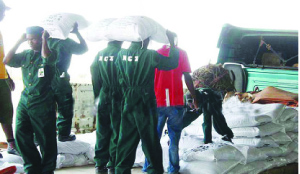By NAKUBIANA MUMBUNA –
STEPS taken by Government in delivery of farming inputs on time to farmers this year guarantee a good harvest, while at the same time ensuring food security for citizens.
Without doubt, food security is of utmost importance to a nation as it guarantees the general well-being of all citizens.
Food security is a requirement that citizens have access to enough food for active and healthy lives.
However, food security can only be guaranteed when the Government puts in place policies that will guarantee a good harvest which ultimately brings about food security.
To this end, the Farmers Input Support Programme (FISP) is one such policy being implemented to guarantee food security in Zambia.
Currently, under the FISP programme the delivery of farming inputs to farmer’s countrywide is actually coming to an end for the 2014/15 farming season.
To further guarantee food security in Zambia, other measures Government has taken for the three years running include increasing the number of small-scale farmers on FISP.
In the 2014/15 farming season, Government increased the number of FISP beneficiaries to 1,000,000 vulnerable but viable farmers.
 In this regard, the Agriculture and Livestock Minister, Wylbur Simusa early this year said the move to increase the number of farmers on FISP was to continue registering increased crop yields to ensure national and household food security.
In this regard, the Agriculture and Livestock Minister, Wylbur Simusa early this year said the move to increase the number of farmers on FISP was to continue registering increased crop yields to ensure national and household food security.
It cannot be disputed that such measures will not only guarantee food security in Zambia but also increase the capacity of the small-scale farmers.
This without doubt, facilitates farmer’s graduation from small-scale farmers into commercial farmers, who ultimately will contribute to national development.
Admittedly, it is such interventions by the Government that have also contributed to the country recording a bumper harvest in the 2013/14 farming season.
With maize being the staple food for Zambian’s, a bumper harvest of 3,350, 671 tonnes in the 2012/13 farming season indeed guarantees food security and extra income for the country through the export of the surplus grain.
However, what is also important to note is that support to farmers is not only done here in Zambia but in many countries world over.
This is usually done to ensure food security and also to empower the small-scale farmers to the point were they can stand on their own.
So steps taken by Government in its determination to grow the agricultural sector in Zambia will indeed bring about growth in the sector.
In gaining more insight into the distribution of inputs this year, the Sunday Times managed to speak to some Government officials and stakeholders who shed more light.
Agriculture and Livestock Permanent Secretary David Shamulenge in shedding light on the delivery of farming inputs under FISP revealed that the Nitrogen Chemicals of Zambia (NCZ) had so far delivered 79,247 tonnes out of the 102,303 tonnes so far produced. This year’s target for NCZ stands at 106,000 tonnes.
In this regard, the continued production of D-compound fertiliser by NCZ following the recapitalisation of the institution by the Government was not in vain but is surly contributing to the development of the agriculture sector in Zambia.
Government recapitalised NCZ about two years ago, to help cut the cost of buying fertiliser outside the country.
The institution since its recapitalisation has performed to its expectations and is in fact working to beat its target of production of D-compound fertiliser for the 2014/15 farming season.
Dr Shamulenge said of the 102,300 tonnes produced 79,000 tonnes had been delivered to farmers in 86 districts.
NCZ spokesperson Shilika Chabalengula said the distribution of top dressing fertiliser or urea would be concluded by end of October.
Surely, with delivery of inputs on time, compounded with good rains a bumper harvest is expected in 2015.
“The distribution of top dressing fertiliser started last week and is expected to finish by the end of October,” Ms Chabalengula said.
However, Ms Chabalengula had earlier this year also told the Sunday Times that one of the challenges that the NCZ was facing, especially in Western Province was the non-availability of deports.
In ensuring smooth delivery of farming inputs next year, these challenges should seriously be addressed.
The Sunday Times also managed to speak to people directly involved in the distribution of fertiliser in Eastern Province.
The District farmer’s coordinator, Virgil Malambo said for the first time in the history of FISP, fertiliser and other inputs have been distributed on time.
Mr Malambo also confirmed that the top dressing fertiliser was also currently being distributed in Chipata.
“This is something that needs to be commended because in the past fertiliser was being delivered quite late sometimes even when the rains have started. But this year they started in the first week of September,” he said.
He, however, mentioned that some farmers were facing challenges in collecting their fertiliser due to the lack of funds.
Meanwhile, Chipata District Farmers Association (DFA) chairperson Tedson Maseko who also confirmed that farming inputs were this year received early said it had been quite difficult for some farmers to collect the fertiliser due to lack of funds.
“The only drawback being faced at the moment is that some of the farmers have not yet received their money from Food Reserve Agency so they have no money to collect the fertiliser,“ Mr Maseko said.
It is these minor challenges that in the 2015/16 farming season need to be addressed.
However, with the information so far revealed, progress is being made in the agricultural sector and one can only appeal to Government to continue in this direction.
To this end, investment in the agricultural sector does not only guarantee food security for citizens but can immensely contribute to the economic development of Zambia.
Without doubt, with increased productivity in the agricultural sector, Zambia’s dependency on copper will be history.







